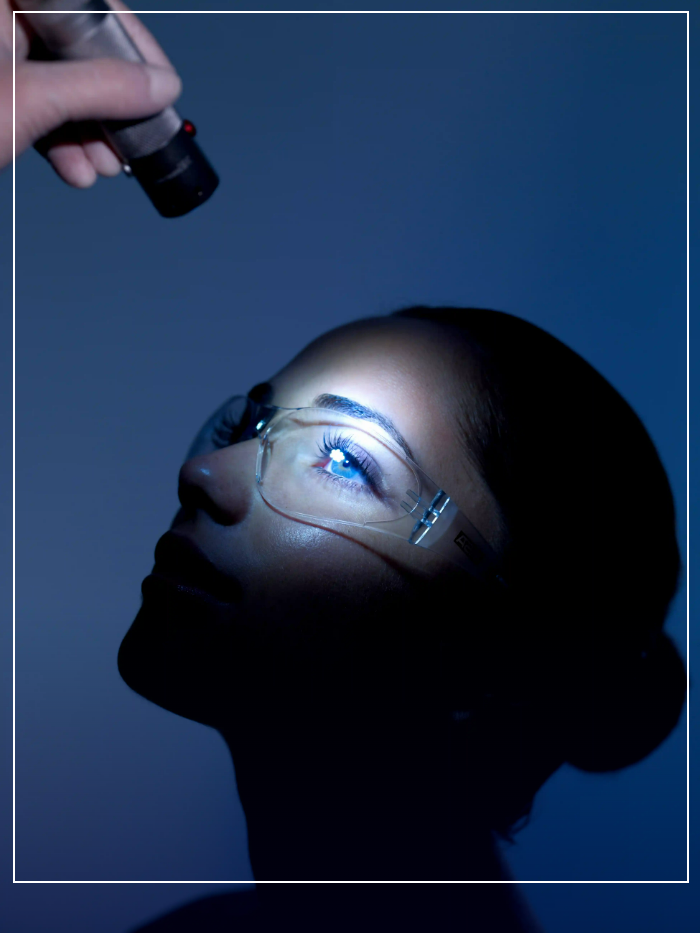Modern skin faces different challenges due to constant digital overexposure. “Before the popularity of screens, the aging process was mainly related to factors such as sun exposure, lifestyle and environmental pollution,” explains Dr. Carmen Goriz of the Ricarte Institute for Medical Research. “Now there is a new factor: blue light, which penetrates deeper into the skin and generates more free radicals than UV rays.”
Of course, many of us are exposed to excessive amounts of blue light every day — after all, it’s hard to completely avoid computer screens and cell phones. “This can cause deeper, more permanent damage to the skin’s structure, speeding up aging in a different, more insidious way,” Goris said. “It causes oxidative stress, which damages skin cells, DNA, and proteins like collagen and elastin.”
Blue light and aging
The shape of the eye is one of the most affected areas. It supports 22 muscle tones and more than 10,000 blinks per day. When we consider that we spend on average more than two decades of our lives in front of a screen, the damage is almost inevitable.
One of Chanel’s biggest launches this year, the N°1 Revitalizing Eye Serum, aims to reverse this damage. “Excessive use of digital screens leads to increased eye fatigue, causing us to squint frequently,” explains Chanel’s science team. “This activates specific muscles around the eyes, and when they contract repeatedly, stress marks and wrinkles can start to form in the delicate eye contour area,” explains Chanel. The serum also contains red camellia extract to help prevent this process, but it also has an added benefit: “The cooling effect provided by the spin-free applicator combined with the gel-like texture improves microcirculation and helps relieve screen-induced eye fatigue.”
Blue light and genes
Of course, our collective interest in longevity and graceful aging is in direct conflict with our modern digital lifestyle – not only with a sedentary lifestyle associated with too many screens, but also with the way light affects the sleep-wake cycle. Dr. Vicente Mera, head of the Department of Internal Medicine and Anti-Aging at SHA Health Clinic, explains: “This can lead to disruptions in circadian rhythms, both in terms of the quality and quantity of restful sleep, and in most of the processes, including hormones and neurotransmitters.
Experts in epigenetics (the study of how external or environmental factors affect our genetic material) are exploring whether the use of digital devices can cause genetic changes. Dr Manel Estler, a world expert in epigenetics, said that aging “may be caused by epigenetic changes that alter the expression of genes in the eye or brain.” However, he also pointed out that “there is still a lack of solid scientific data to verify this hypothesis.”
However, it is clear that the use of digital devices and the excessive stimulation they cause constitute a poor lifestyle pattern for healthy aging.
blue light and beauty
Luckily, many beauty brands have come up with ways to mitigate the damage to some extent. A major focus in the skincare sector is studying how habits influence our genes, to a greater extent than we think – some experts claim that 85% of it is influenced by our lifestyle.
Eucerin has conducted pioneering research in this field, leveraging its potential in skin care, launching the Epigenetic Hyaluronic Acid Filler Serum, which uses patented technology to re-energize skin that has become sluggish from an unhealthy lifestyle. “Our goal is not only to optimize the function of aging skin, but also to rejuvenate its cells,” says Nuria Cuesta, medical director of the brand.
French beauty brand Clarins is also considering this. After studying more than 60 twin sisters with identical genetic heritage, their scientists found that an imbalanced lifestyle caused a 44% increase in methyl methyl groups, which are inhibitors of genes present in fibroblasts and therefore related to skin rejuvenation. The brand has therefore released a new dual serum that focuses on the ability of organic Giant Provence Reed and turmeric to neutralize these epigenetic modifications linked to a poor lifestyle.
Blue light and lifestyle
In addition to advances in skin care that are redefining the anti-aging field, there are other ways to tackle the problem besides reducing screen use and wearing blue light glasses. Goreese recommends using an SPF sunscreen every day with antioxidants like vitamins C and E to neutralize free radicals. “This is especially effective if it contains iron oxides and other active ingredients that block UV rays and high-energy visible light,” she says.










